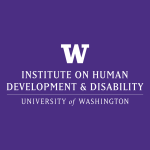Home / Research Projects /
Contact: Kate Orville (orville@uw.edu)
Core Function: Information Dissemination, Technical Assistance and Outreach Training
Program: Clinical Training Unit (CTU)
A ‘medical home’ is primary health care that is team-based, holistic, and centered on the patient and family. This project is funded by the Washington Department of Health (DOH) Children and Youth with Special Health Care Needs (CYSHCN) program.
The Medical Home Partnerships Project helps WA Title V Program to meet their federal performance measures to improve access to medical homes, increase the percentage of children who receive early developmental and other screenings, and improve systems of care for CYSHCN, including patient/family-provider partnership.
Project activities include:
- Provide technical assistance and support to 27+ county or clinic-based Medical Home teams, Community Asset Mapping coalitions, or county-based interdisciplinary autism diagnostic teams or networks improving care for CYSHCN across Washington. Pediatric clinics focus on improving overall ‘medical home-ness,’ care coordination, and developmental screening and referral for children whose families do not have English as a main language. The CAM coalitions bring together community providers from primary care, schools, behavioral health, early intervention, family support to collectively improve early identification and evaluation of children with autism and/or other developmental disabilities. Autism Diagnostic teams and networks organize around how to build community capacity to diagnose more children closer to home and avoid the long wait lists at tertiary care centers.
- Provide leadership and consultation on state Universal Developmental Screening initiatives, including, Help Me Grow Washington, Central Washington Help Me Grow, Essentials for Childhood, and WA Frontiers of Innovation. These efforts are working to: a) identify and mitigate social determinants of health, b) increase parental and community awareness of optimal ways to support and nurture children in the prenatal period and first years of life, c) build on local developmental screening efforts in both health care and early childhood settings ensure all children are screened, d) address gaps in and link families to services that improve community provision of needed resources, and f) address policies at the local and state level that impact these efforts.
- Research and write Child Health Notes (CHN), a quarterly one-page newsletter for pediatric primary care providers and others caring for children with special needs. Local communities adapt the newsletter resources section to include contact information for key local resources.
- Provide trainings to Pediatric residents, LEND Fellows, public health students, nutritionists, dentists, and parents of CYSHCN on serving children through the medical home model and how to access key community resources.
- Disseminate information on how the Medical Home Neighborhood (primary care, families, and community partners) can support children, their families and providers in Washington State through the project website medicalhome.org as well as through the project listserv with 300 subscribers.
- Provide technical assistance to Department of Health led initiatives including the Collaborative Improvement and Innovation Network (CoIIN) to Advance Care for Children with Medical Complexity, the Washington Statewide Family Leadership (WSLI) Coalition for family-led organizations supporting families who have children and youth with special health care needs, and the WSLI Family Navigation Workgroup.

